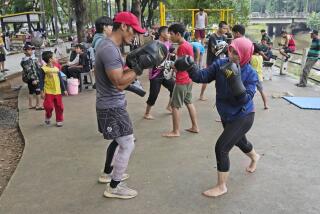Indonesia’s ‘Lightning Quick’ Justice Condemned
- Share via
BANDA ACEH, Indonesia — Suspected rebels in Indonesia’s war-torn province of Aceh get multiyear prison terms after one-hour trials. Many have no lawyers. Confessions, by many accounts, are extracted through torture.
“They treated us like punching bags several rounds a day during interrogations,” says a 40-year-old teacher sentenced to five years for treason.
As the government wages an all-out war to snuff out a separatist rebellion, justice in Aceh is often a matter of pengadilan kilat -- Indonesian for “lightning quick.”
The government says speedy convictions are needed to crush the rebellion -- now in its 28th year and in a particularly intense phase after the collapse of a peace accord in May.
Critics counter that Aceh’s trials are kangaroo courts.
“I blinked and the judges banged the gavel to end the trial,” said the teacher, who had neither a lawyer nor any witnesses when he was tried on charges of collecting rice from villagers to raise funds for the rebels.
“Everybody in my village wanted to testify that I was collecting rice to raise funds for my school, but they were too scared to come to court,” he said.
Like other inmates interviewed, he asked not to be named for fear of angering authorities and provoking more beatings.
Aceh’s war has roots in an independence struggle that began in 1870, when the Dutch invaded what was then a Muslim sultanate.
In 1976, the conflict regained momentum after the Free Aceh Movement declared independence in the wake of a broken promise by the national government in Jakarta to give Aceh autonomy. Many locals accused the government of siphoning off revenues from the province’s oil and natural gas resources.
Some 12,000 people -- most of them civilians -- have been killed in nearly three decades of fighting.
Many Acehnese support independence but are less enthusiastic about the rebels and their violent tactics, which make civilians feel threatened by both sides. They have called for a referendum on independence, like the one in August 1999 that led to East Timor province becoming independent.
Reporters’ freedom of movement in Aceh has been severely curtailed since the government declared martial law in the spring. But an Associated Press reporter was recently allowed to visit the province at the far western end of the Indonesian archipelago and was able to speak to accused rebels in detention, their relatives, soldiers and legal aid workers.
The detainees complained bitterly about their interrogations, which they said included beatings.
“That’s the really hellish part. We all dream for it to be over,” one prisoner said. “The dirty rebel war is not just in the jungle but in jail cells of the towns and cities.”
Authorities insist that the accused are treated fairly.
Few deny that Aceh’s justice system has been a casualty of Asia’s longest-running war, with courthouses burned down by rebels and a number of judges forced to abandon their benches by rebel death threats.
Judges are chosen by the justice ministry in Jakarta and come from all over Indonesia to help reduce the backlog of cases. Few are native Acehnese.
Nani Sukmawati, head judge of Pidie court, which ruled on 72 cases in six weeks, conceded that her judges were overworked and pressed for time.
She said that during the recent Muslim holiday of Eid al-Fitr at the end of the fasting month of Ramadan, her judges scrambled to push cases through because they were “in a rush to get home for the holidays.”
Forty percent of the roughly 1,200 suspected rebels detained in the current offensive have no defense lawyers, even though Indonesian law requires that counsel be appointed if defendants face more than five years’ imprisonment, said Afridal Darmi, head of the Aceh Legal Aid Foundation.
The private lawyers’ group, funded by local and international donors, is considered neutral and has accused both sides in the conflict of rights abuses.
Treason, the charge used against virtually all those detained as suspected rebels, carries a maximum sentence of 20 years. Witnesses are seldom brought into court to be cross-examined. Instead, incriminating testimonies are simply read aloud.
During a jailhouse interview, the teacher convicted of treason pointed to scabs on his arms that he claimed were the result of being dragged across concrete. He said he had seen some prisoners attempt suicide inside their cells because they couldn’t stand the beatings.
“One man jumped inside a deep well and it took 10 inmates to get him out,” the teacher said.
Over the last six months, the central government has deployed about 35,000 soldiers to Aceh and claimed to have killed some 1,200 rebels, or a fifth of the insurgents’ estimated force.
Legal aid workers say the military also pressures judges to hand down guilty verdicts quickly against suspected rebels.
Acehnese rights activists worry that military abuses and the perception that the judiciary is unfair will fuel resentment toward the central government and increase sympathy for the Free Aceh Movement rebels.
“The military has full control in Aceh. This casts a very, very dark shadow on the legal system,” said Afridal at the legal aid group.
Indonesia’s military chief, Gen. Endriartono Sutarto, denied that the army interferes in the judicial system.
“We have never pressured judges. The most important thing is that suspects are not left languishing in jail for months,” he said.
The region’s jails can hardly accommodate the frenzied pace of convictions.
Some are well kept, with wardens allowing long visiting hours during which wives and children can bring food and sit with their detained loved ones.
Other jails cram 150 inmates in spaces meant for 60, with little or no room to lie down or sleep.
More to Read
Sign up for Essential California
The most important California stories and recommendations in your inbox every morning.
You may occasionally receive promotional content from the Los Angeles Times.













